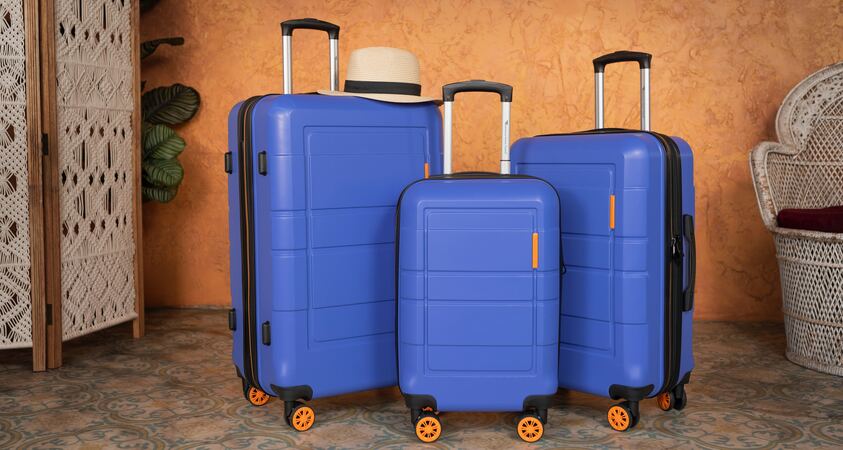We understand that insuring your luggage comes with some costs. Therefore, you should carefully consider when travel luggage insurance is worthwhile and could benefit you. Especially for longer flights or frequent layovers during your trip, it is advisable to insure your luggage. This is due to the higher likelihood of your luggage being damaged.
For both short-haul and long-haul flights, it is true that insurance is more worthwhile the more valuable the contents of your suitcase are. To help you decide whether baggage insurance is suitable for you, we answer the most important questions in our article. This way, you can weigh for yourself whether and in which cases travel luggage insurance makes sense for you or not.
This page contains affiliate links marked with an asterisk (*). If you decide to make a purchase after clicking on a link, we may receive a commission at no additional cost to you.
What Services Does Baggage Insurance Cover?
A baggage insurance policy can generally cover damage caused by loss, theft, and damage to luggage. The specific services covered by travel luggage insurance can vary depending on the provider. This also applies to the amount of the insurance coverage.
Typical services that baggage insurance can cover include:
- Reimbursement for delayed arrival of your luggage.
- Coverage for necessary replacement purchases.
- The option to combine with other insurances, such as travel health, travel liability, travel accident, trip interruption, and trip cancellation insurance.
- Coverage for stolen luggage.
- Reimbursement for transport damages.
To ensure you find the right insurance that covers all relevant services for you, you should compare different insurance providers before your trip.
Are There Items That Are Not Covered by the Baggage Insurance?
Typically, some items are only insured up to a certain limit. This can be a fixed amount in dollars or a percentage of the maximum insurance coverage. We have listed below the items that require special caution:
• Cameras,
• Jewelry,
• Travel documents,
• Cash,
• Laptops,
• Smartphones,
• Hearing aids,
• Musical instruments,
• Glasses,
• Contact lenses,
• Diving equipment,
• Bicycles,
• E-scooters,
• Golf equipment,
• Surfboards,
• and other sports equipment.
Please also note that some of these items are only insured under certain conditions. Detailed information can be found in the contract documents of your chosen insurance provider. For example, jewelry is often only insured if it is stored in a safe or if you carry it securely in your personal custody.
What Costs Should I Expect for Travel Luggage Insurance?
The question of how much baggage insurance costs depends on various factors and cannot be answered in a general way. Besides the value of the travel luggage, the number of insured persons, the duration of the trip, and the amount of the deductible can also influence the costs. Additionally, the price depends on whether you purchase baggage insurance for a single trip or for an entire year.
When Is the Airline Liable for Lost or Damaged Baggage?
Depending on where and how your luggage was damaged or lost, not only your travel luggage insurance but also your airline may be responsible and have to pay compensation.
If your checked luggage is damaged or lost, your airline must cover the damage incurred. The question of their liability is not relevant in this case. However, a different situation arises if your carry-on luggage is damaged. In such cases, the airline must be responsible for the damage for you to be entitled to compensation. However, proving this in specific cases can be difficult.
A piece of luggage is considered lost if it has not reappeared after 21 days. Some airlines confirm that a piece of luggage is lost after a shorter period. In this case, the airline must reimburse the suitcase and its contents. Note, however, that the maximum reimbursement amount for both damage and loss is between approximately $1,525 and $3,500 per person. If you are transporting significantly more valuable items in your luggage or want to protect yourself against theft, additional travel luggage insurance may be advisable.
How to Further Protect Your Luggage: Our Tips
In addition to travel insurance for your luggage, there are several extra steps you can take to protect your suitcase and carry-on. Below is a list of helpful tips to consider for your trip to Curaçao.
➤ Store valuables that you won’t need during the day in the safe of your accommodation. This is especially important for valuable jewelry and keys. However, note that valuables in safes are only insured up to a certain amount, which varies depending on the country.
➤ To track the current location of your luggage, consider using a small GPS tracker. You can link it to your smartphone to always know where your suitcase is. If the suitcase gets lost, the tracker can help you locate it faster. You can find GPS trackers in various quality and price ranges. While Apple AirTags, as a high-end option, promise the highest reliability, other providers offer more affordable alternatives*.
➤ For valuables you need daily, keep them as close to your body as possible. We recommend practical waist bags* with plenty of storage space for smartphones, travel credit cards, ID documents, and cash.
➤ Make copies of your essential travel documents, including your passport and ID card. Save these as scans on your laptop and smartphone. If these documents are stolen or lost, having copies will make it easier to get replacements.
➤ Carry only as much cash as you need for your vacation. In Curaçao, you can often use a travel credit card for payments. Depending on the provider, cash withdrawals abroad may even be free of charge.
➤ Another way to make it easier to identify lost luggage is with name tags*. Bright luggage tags come in different designs and can help you quickly spot your suitcase on the baggage carousel.
➤ As a solo traveler, you may not be able to leave some valuables in the safe because you need them, and there’s no one to watch them at the beach. For these situations, we recommend a waterproof bag* so you can swim without worrying about your valuables.
➤ Store your laptop in a shockproof, water-repellent case* for extra protection. Since airlines may not cover damage to carry-on items, it’s crucial to ensure their safety.
➤ Invest in a sturdy suitcase that protects its contents from external impacts. Hard-shell suitcases* offer excellent protection and are usually waterproof.
These tips can help ensure your belongings remain safe and secure, allowing you to enjoy your trip with peace of mind.
Conclusion: An Individual Decision
Whether travel luggage insurance is worth it for you depends on several factors. If you’re carrying valuable items, such as a DSLR camera or a high-end laptop, or bringing your diving gear to Curaçao, purchasing insurance might already be worthwhile.
Additionally, coverage for theft is a real advantage. Generally, the more frequently you travel and the longer the flight, the higher the risk of damage. Therefore, we highly recommend comparing the costs of insurance and weighing them against the value of your luggage contents. This way, you can determine how beneficial travel luggage insurance is for you.








